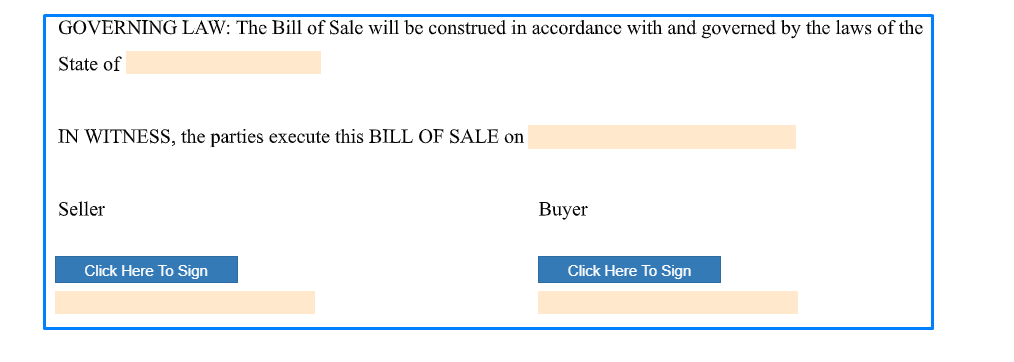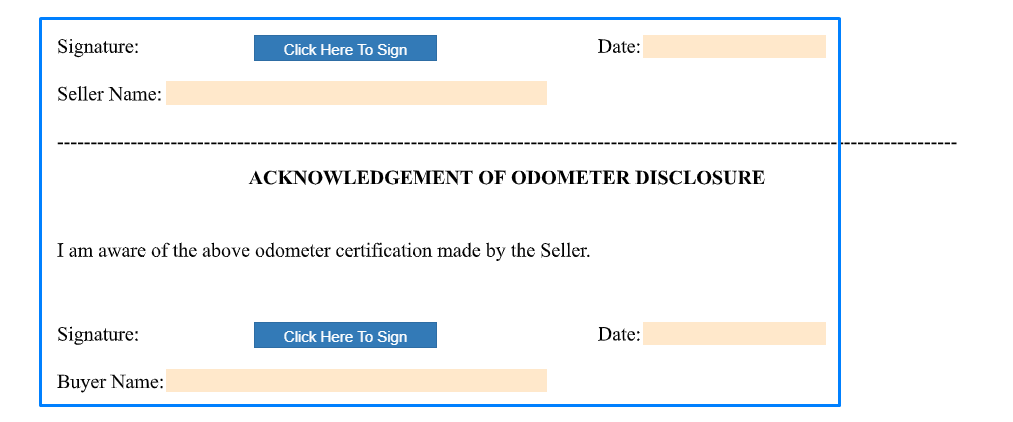Fillable Form Vehicle Bill of Sale
A Vehicle Bill of Sale is a binding document that includes the details of the transaction, price, mileage, and quality of the vehicle to transfer ownership of a vehicle from one party to another.
Fill and sign Vehicle Bill of Sale online and download in PDF.
What is a Vehicle Bill of Sale?
A Vehicle Bill of Sale is a type of document that serves as a receipt that a purchase of a vehicle took place. It is a legal document that transfers ownership of a vehicle to another person, in exchange for cash or trade. In some states in the U.S., a signed bill of sale is required to register a vehicle.
An individual should use a bill of sale if he or she owns a vehicle that he or she would like to sell or plan to buy a vehicle from a private seller. The document also serves as a record or proof that details the purchase.
How to fill out a Vehicle Bill of Sale?
Get a copy of Vehicle Bill of Sale template in PDF format.
In general, a Vehicle Bill of Sale contains several pages that specify the details of the transaction, including but not limited to financial terms, quality of the vehicle, mileage, and personal information of both the seller and the buyer.
Before engaging in a transaction and completing a Vehicle Bill of Sale, be prudent and review state or local laws to ensure compliance and avoid any legal problems.
Follow the instructions to answer the document accurately:
Page 1

For the first part of the document, provide the state and county where the purchase will take place. Provide the amount of the vehicle and the date of the transaction.

The body of the document asks for the price of the vehicle, inclusive of all sales taxes, and the names and addresses of both the seller and buyer.

Provide the details of the vehicle:
- Vehicle Type
- Model or Series
- Color
- Body Style
- Make
- Year
- Vehicle Identification Number (VIN)
- Odometer Reading

Specify if the buyer’s mode of payment.
Page 2

After the Terms and Conditions stipulated in the contract, at the end of the second page, provide the state where the purchase will take place and the date of the transaction. To make the Vehicle Bill of Sale legally-binding, both the seller and buyer must sign on the appropriate signature fields.
Page 3

The third page of the Vehicle Bill of Sale contains the Odometer Disclosure Statement. Provide the name and address of the seller. Specify the current odometer reading and mark the appropriate checkboxes that certify acknowledgment of the specified odometer reading.

Lastly, both the seller and buyer should sign the disclosure statement, provide their full legal name, and provide the date of acknowledgment.
Start filling out a Vehicle Bill of Sale sample and export in PDF.
Frequently Asked Questions About a Vehicle Bill of Sale
Is a Vehicle Bill of Sale the same as a vehicle title?
No, a Vehicle Bill of Sale is not the same as a vehicle title.
A Vehicle Bill of Sale is a legal document that outlines the responsibilities of each party for things like fees and taxes, insurance, maintenance, and repairs. The title to a vehicle specifies who owns it legally. In most states, when you buy a car from a dealer or an individual who has clear ownership of the vehicle, you can get a copy of the title from your local Department of Motor Vehicles (DMV) office.
If you buy the car from someone who does not own it, like when you buy it at an auction or through a private sale, then they might not give you the title. In that case, you will have to get a Vehicle Bill of Sale from the seller and then take that bill to your local DMV. The DMV might provide you with a title for the car, or they might not. If the DMV provides the title, it is often called a Certificate of Title.
If the DMV does not provide you with a title, there is often no way for you to have legal ownership of the car. In those cases, you might want to contact your local police department.
What should a Vehicle Bill of Sale include?
A Vehicle Bill of Sale should include the following:
- date, the names, and addresses of both parties to the bill;
- a description of the vehicle being sold that includes its make, model, year, and Vehicle Identification Number (VIN);
- how much is selling for;
- who will pay what amount in sales tax, if applicable; and
- who will be responsible for any liens on the vehicle.
A Vehicle Bill of Sale is a legal document that serves as proof of an agreement between two parties, such as the purchase and sale of a vehicle. It also acts as a contract to outline the responsibilities of each party for things like fees and taxes, insurance, maintenance, and repairs. It includes information on how much is selling for, who will pay what amount in sales tax if applicable, and who will be responsible for any liens on the vehicle.
When should a Vehicle Bill of Sale be used?
A Vehicle Bill of Sale can be used as a legal record of any vehicle sale or purchase. It can be used to establish legal ownership of a vehicle.
A Vehicle Bill of Sale should be created any time two parties are involved in the sale of an automobile, including buying from a private seller, buying at an auction, trading in for another vehicle, and loaning a vehicle to another person.
How much does a Vehicle Bill of Sale cost?
A Vehicle Bill of Sale is often free for the buyer, but it can vary widely from state to state and depending on whether or not there is a lien against the car. If a lien exists, then a title will also need to be transferred, which could involve a significant fee.
Can I make my own Vehicle Bill of Sale?
Yes, you can make your own Vehicle Bill of Sale. There are many templates available online, some of which can be filled out in a matter of seconds. However, make sure to double-check all information to ensure it is accurate and complete. You also need to follow the laws of the state where you will be using the Vehicle Bill of Sale.
As a Vehicle Bill of Sale can be important in an accident or vehicle repossession, creating one as soon as possible is best, so you do not risk forgetting any key information.
Why should I use an attorney to make a Vehicle Bill of Sale?
It is not necessary to hire an attorney to make a Vehicle Bill of Sale. However, many people choose to do so because attorneys are more familiar with all the laws and information about vehicle sales and purchases. By hiring an attorney, you can also ensure your Vehicle Bill of Sale will be completed in accordance with state law.
How do I find an attorney to make a Vehicle Bill of Sale?
You should be able to find an experienced, licensed attorney through your local bar association. Attorneys usually have information on their websites about how to contact them for legal representation, and many are reachable by email or phone during regular business hours. Most attorneys provide free consultations and will work on a contingency fee basis.
What happens if I lose my Vehicle Bill of Sale?
If you lose your Vehicle Bill of Sale, you can request a copy from the Department of Motor Vehicle or other official vehicle-owner records in your state. If there was not a lien on the car and it was sold to another person, you might be able to get a copy from that new owner.
If a Vehicle Bill of Sale is not available, it might also be possible for you to request the last known title of the vehicle. However, since a Vehicle Bill of Sale contains more information than a title, it is often preferred over any other documents.
Does a Vehicle Bill of Sale protect you?
A Vehicle Bill of Sale can protect you in the event that your car is repossessed. By signing a Vehicle Bill of Sale, both parties agree to negotiate with any lender or other creditor listed on the title to return the vehicle before going through a potentially lengthy and costly legal process.
In some cases, you might be able to get your vehicle back without a court order if the lender or creditor does not know about the sale. One of the most important steps you can take to protect yourself is to notify your state's Department of Motor Vehicle that there was a change in ownership of the vehicle.
After receiving notification, your state will send out a new title and registration for more than just one year, which will help protect you if the lender re-sells your car to another person.
How do I find out if there is something wrong with the vehicle I want to buy?
It is best to have an expert or mechanic inspect its condition before signing any paperwork if you have not personally inspected a vehicle before purchasing it.
How do I transfer a title with a Vehicle Bill of Sale?
To transfer a title using a Vehicle Bill of Sale, you need to provide it along with your state's current title to a Department of Motor Vehicle or other official vehicle-owner records office. Take a valid identification with you, as well as any paperwork from the Vehicle Bill of Sale.
In most cases, the transfer will be processed immediately and go through without a problem. However, it might be necessary for you to apply for a replacement title, depending on the type of sale.
Some states require the seller of the vehicle to notify the Department of Motor Vehicle about the transfer within five days after the sale. While the buyer or the new owner of the vehicle must take the vehicle for an inspection and report the transfer within ten days after buying it.
Can I sell a car without a Vehicle Bill of Sale?
If you want to sell your vehicle but do not want to enter into any legal commitments, selling the car "as-is" is usually the safest way. It means that if there are major mechanical problems with the vehicle, you will not be held responsible for them as long as you have properly disclosed any issues.
However, even if you have sold your car "as-is," it is still a good idea to fill out a Vehicle Bill of Sale. This way, you can protect yourself from any false claims of ownership and prevent potential problems with your state's Department of Motor Vehicle.
How do I cancel a Vehicle Bill of Sale?
You or the other party can end your agreement by canceling the Vehicle Bill of Sale before it is filed with any state department. To do this, both parties need to sign and date an official document stating their decision to cancel the Vehicle Bill of Sale. This document must be kept by both parties for their records.
Once the Vehicle Bill of Sale is canceled, no legal actions can take place unless it has been filed with the Department of Motor Vehicle.
Is a Vehicle Bill of Sale enough to buy a car?
A Vehicle Bill of Sale can be used to make a sales agreement. Although the Vehicle Bill of Sale itself does not contain any legal weight, it will help you negotiate with lenders or other creditors listed on your current title if they try to repossess the vehicle.
Be aware that this document alone cannot protect you from any specific damage or condition of the vehicle. Before you sign a Vehicle Bill of Sale, check to ensure that you are willing to take on any plausible risks if something goes wrong with the vehicle.
What is the difference between a Vehicle Bill of Sale and an Affidavit?
A Vehicle Bill of Sale and an Affidavit can both be used to transfer ownership of a vehicle, but there is one important difference between them.
An Affidavit only requires the signatures of two parties involved in the sale or trade of a vehicle, with no further steps required after signing.
On the other hand, a Vehicle Bill of Sale must also contain the date of sale, the full name, and address of each party involved, vehicle information, plus signatures. Since this document requires more information than an Affidavit, it is required whenever you transfer your car's title to a new owner or start working with state agencies regarding the vehicle.
Is a Vehicle Bill of Sale required when selling a car?
Many state governments require parties involved in a vehicle sale to fill out a Vehicle Bill of Sale. Each state's Department of Motor Vehicles has its own process for filing this document, but it can typically be found at the same office where you get your vehicle title or transfer documents.
Who keeps the Vehicle Bill of Sale?
Typically, the seller of the vehicle keeps the Vehicle Bill of Sale. He or she may use it to protect himself or herself in case anyone tries to file a claim against the sold car.
The buyer or new owner of the vehicle must also keep a copy of their Vehicle Bill of Sale. He or she may use it to obtain a certification of Title from the Department of Motor Vehicles.
No matter who you sold your vehicle to, it is a good idea for both parties in the sale to keep copies of the Vehicle Bill of Sale. This way, both parties can prove that they are the lawful owners of the car if any legal issues with the vehicle arise later.
Can you register a car with a Vehicle Bill of Sale?
If you want to register a vehicle, your state's Department of Motor Vehicles (DMV) will require proof that you own it. This proof can be provided by the Vehicle Bill of Sale or an official title transfer document.
Some states, such as Florida and Virginia, accept a Vehicle Bill of Sale to process vehicle registration. However, it is unlikely that your DMV will accept this document alone to register a car. In most states, you will need to have an official title transfer completed before registering a vehicle.
To register your vehicle with your state, you need to file a Vehicle Registration/Title Application along with your Vehicle Bill of Sale and other identifications.
What do I need to know when selling a car privately?
If you are selling a car privately, you need to be careful and take extra precautions to protect yourself and the new owner.
Selling a vehicle through an ad or online without legal protection could leave you with no proof of your sale if problems with the vehicle arise later. The Vehicle Bill of Sale can provide protection for both parties involved in the sale by protecting you from any legal issues with the vehicle.
For example, if your car is totaled in an accident, you can provide the Vehicle Bill of Sale as proof that you no longer have responsibility for it. The buyer cannot file a claim against the vehicle once they have signed off on their part of the Vehicle Bill of Sale.
Can a Vehicle Bill of Sale be written on a piece of paper?
No, a Vehicle Bill of Sale cannot be written on a piece of paper.
A Vehicle Bill of Sale is a simple document, but you need to be careful when filling it out. The Department of Motor Vehicles may not accept handwritten versions of this document and will require one that has been filled out with legible information in order to process the title transfer.
Why do you need a Vehicle Bill of Sale for a car?
A Vehicle Bill of Sale is essential for both the buyer and the seller.
The seller of the vehicle needs to keep a copy of their Vehicle Bill of Sale in case they need to prove that they no longer have responsibility for the car.
The buyer may use the Vehicle Bill of Sale in order to obtain a title for the vehicle. The buyer also needs to keep this document as proof that he or she purchased the vehicle, making him or her its legal owner.
Is a Vehicle Purchase Agreement the same as a Vehicle Bill of Sale?
No, a Vehicle Purchase Agreement is different from a Vehicle Bill of Sale.
A Vehicle Purchase Agreement simply documents the terms of your agreement for selling or buying a vehicle, while a Vehicle Bill of Sale transfers legal ownership to another person.
Both are important in protecting you should any issues arise with the vehicle, but they serve different purposes.
Is a Vehicle Bill of Sale the same as a Bill of Sale?
No, a Vehicle Bill of Sale is not the same as a Bill of Sale. However, a Vehicle Bill of Sale is a type of Bill of Sale.
A Bill of Sale is generally used in any situation where a sale of a product or service occurs. A Vehicle Bill of Sale is specifically used for vehicle purchase transactions.
Is a Vehicle Bill of Sale binding?
Yes, a Vehicle Bill of Sale is binding if both parties agree to the terms.
The Vehicle Bill of Sale verifies that you are no longer responsible for your vehicle once you have sold it. On the buyer's side, a Vehicle Bill of Sale states that he or she has purchased the vehicle and is now its legal owner.
If there is a disagreement between either party, the Vehicle Bill of Sale will not be held as a legal document in a court of law.
How long is a Vehicle Bill of Sale good for?
A Vehicle Bill of Sale only has to be signed by both parties and isn't required to have an expiration date. The length of validity for this document is determined by the agreement of the buyer and seller.
You can choose to keep it valid or change the expiration date once you have both signed it.
Does a Vehicle Bill of Sale release liability?
Yes, a Vehicle Bill of Sale does release liability.
The seller is no longer responsible for the vehicle once he or she has signed over the title to the new owner. The buyer then assumes full responsibility for this vehicle from that point forward.
Does a Vehicle Bill of Sale release liability?
Yes, a Vehicle Bill of Sale does release liability.
The seller is no longer responsible for the vehicle once he or she has signed over the title to the new owner. The buyer then assumes full responsibility for this vehicle from that point forward.
Does a Vehicle Bill of Sale have to be notarized?
No, a Vehicle Bill of Sale does not need to be notarized.
A Vehicle Bill of Sale is a simple document that should only include your signature and the signatures of both parties involved in the sale. It does not require any other information or documents before it can be signed.
However, some states require a Vehicle Bill of Sale to be notarized, including Louisiana, Nebraska, Maryland, New Hampshire, West Virginia, and Montana.
Who is responsible for changing ownership of a vehicle?
The buyer is responsible for changing ownership of a vehicle once he or she has purchased it.
To do this, you may need to file the Vehicle Bill of Sale with your state's Department of Motor Vehicles in order to transfer title and register the vehicle.
Although some states allow owners to complete the registration process themselves, most require an authorized agent to do it for you.
You will likely need to complete an Application for Certificate of Title and Registration in order to receive a new title. You can visit your DMV's website or office for more detailed information about registering a vehicle in your area.
What happens if the buyer does not transfer the title?
The transfer of a vehicle starts with drafting a Vehicle Bill of Sale. If signed by the seller and the buyer, the buyer has the authority to register it with the Department of Motor Vehicles. The buyer must also register the vehicle under his or her name within ten days after the sale.
The failure to transfer the title will leave the buyer with no legal claim to the vehicle.
What happens if the seller does not transfer the title?
The buyer must file a notice of sale to transfer ownership and register the vehicle in his or her name. The notice must be filed within five days after the sale. If the seller does not transfer the title, the vehicle will be forfeited to the state. The buyer can file a claim with the police for theft or file a lawsuit in small claims court against the seller.
Can I electronically file a Vehicle Bill of Sale?
Yes, you can fill out and file an electronic version of your Vehicle Bill of Sale. However, you must submit a hard copy of your Vehicle Bill of Sale to the Department of Motor Vehicles (DMV). It is because electronic vehicle records are not yet official in some states.
You will need to provide a printed copy of the Vehicle Bill of Sale with your application when you register the vehicle, which can be done at your local DMV office.
Create a Vehicle Bill of Sale document, e-sign, and download as PDF.
Related articles:
















